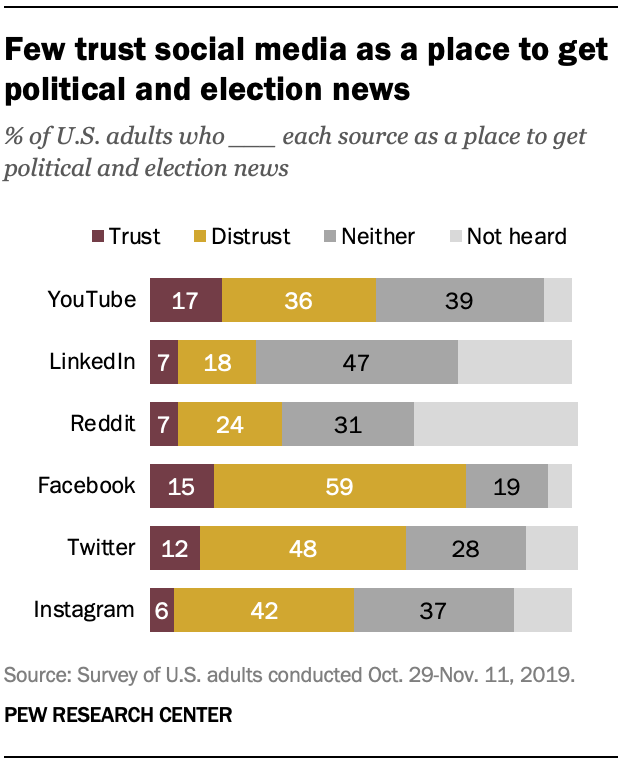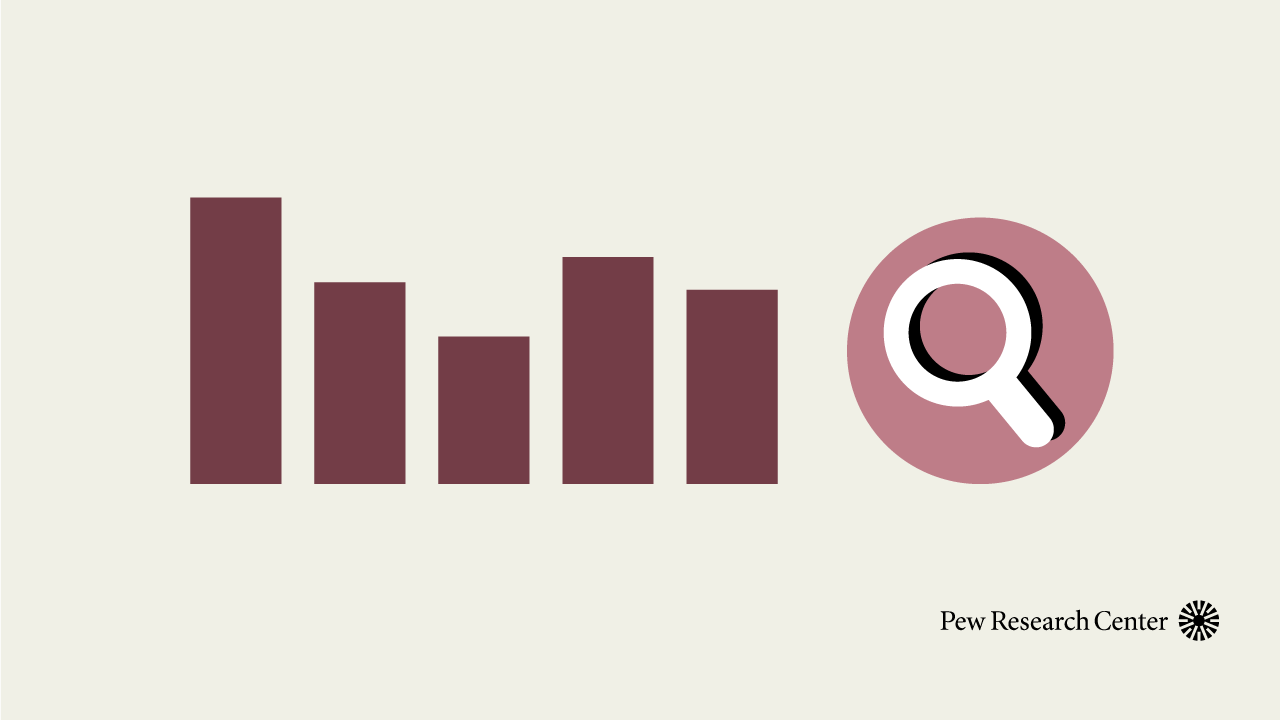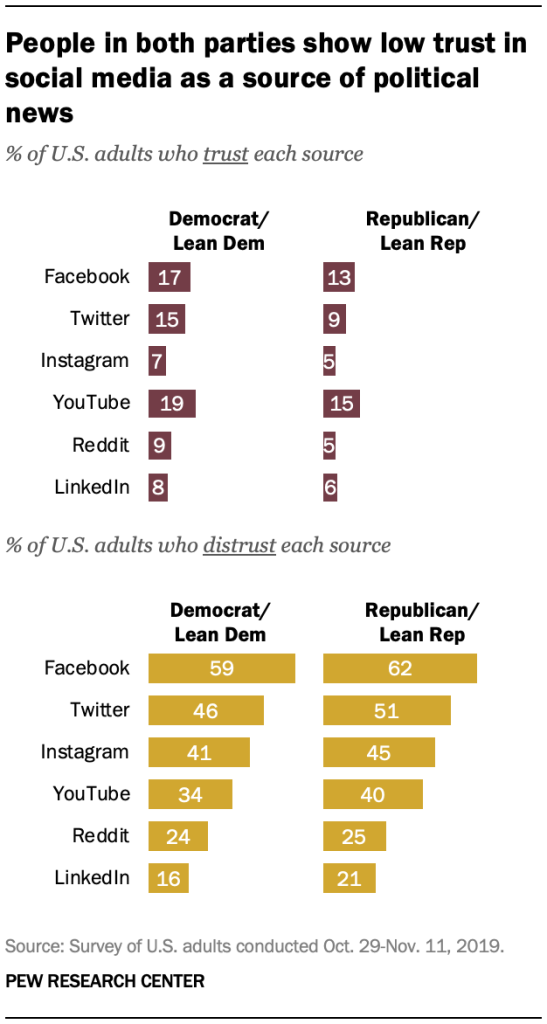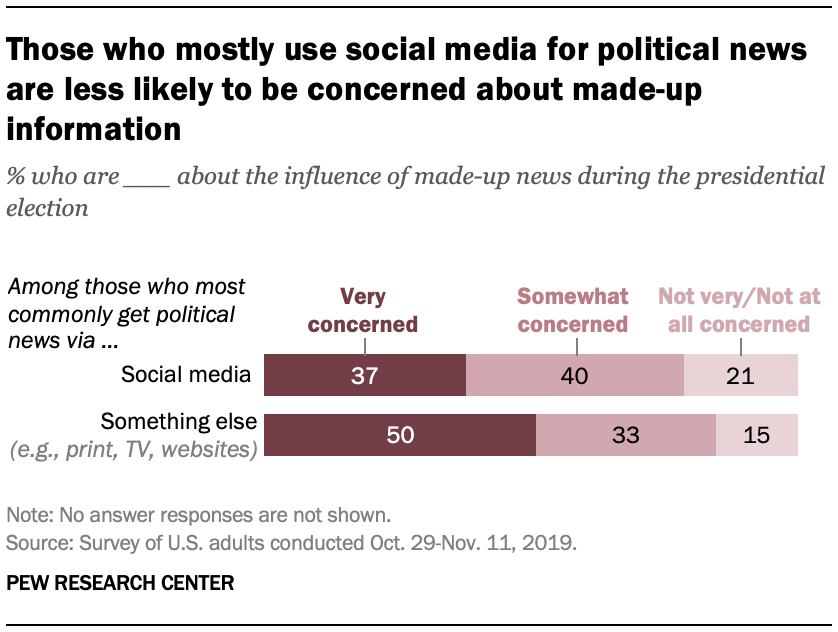
As we enter the 2020 election year, a large majority of Americans are familiar with the major social media sites in the rapidly expanding digital universe. Moreover, a number of them are also sources for political and election news for many Americans, according to a new analysis of data from Pew Research Center’s Election News Pathways project.
The current analysis, based on a survey of 12,043 U.S. adults who are members of the Center’s American Trends Panel conducted from Oct. 29 to Nov. 11, 2019, finds that despite Americans’ level of familiarity with these social media sites, both Democrats and Republicans (including independents who lean toward either party) – in an unusual display of bipartisan convergence – register far more distrust than trust of social media sites as sources for political and election news. And the most distrusted are three giants of the social media landscape – Facebook, Instagram and Twitter.

Want to see more data on these questions?
To analyze these survey questions by additional media habits and demographic characteristics, visit the interactive tool and access the dataset.
Indeed, Facebook, the most widely used of the six social media sites examined when it comes to getting political and election news, is distrusted by about six-in-ten U.S. adults (59%). That includes almost equal percentages of Democrats and independents who lean Democratic (59%) and Republicans and independents who lean Republican (62%). Close to half of all U.S. adults also say they distrust Twitter (48%), and about four-in-ten (42%) distrust Instagram.
Not everyone, however, is as concerned about the credibility of social media sites as sources of political and election news. Those who say social media sites are their “most common” way of getting this news evince more trust in those sites and voice less concern about the influence made-up news could have on this year’s election.
Respondents were first asked about their awareness of six different social media sites. If they had heard of a site, they were then asked whether they trust, distrust and use the site as a source of information for political and election news. The same questions were also asked about 30 other news sources, the findings of which are discussed in a separate report.
The reach of social media sites
Of the six social media sites examined in this study, most are known to a large majority of Americans. About nine-in-ten U.S. adults say they have “heard of” Facebook (94%), YouTube (93%), Twitter (88%) and Instagram (86%). Almost three-quarters (73%) have heard of LinkedIn, and 62% have heard of Reddit.
These sites also serve as sources for political and election news for certain segments of Americans. First among them is Facebook, used by 25% of U.S. adults as a source for political news in the past week. That makes it less widely used than Fox News, CNN and the three major commercial TV news outlets (ABC, CBS and NBC), but more used than a host of other sources asked about, including NPR (20%), The New York Times (20%), The Washington Post (17%) and The Wall Street Journal (13%).
The next sites most commonly used for political news are YouTube (17%) and Twitter (14%), with the rest in single digits.
Distrust of social media sites crosses party lines

The findings reveal that while social media sites may reach a substantial number of Americans, they also face a credibility challenge. The social media sites with the highest percentage of distrust among all adults are Facebook (59%), Twitter (48%) and Instagram (42%), followed by YouTube (36%).
Overall, more Americans express distrust than trust in all six of the social media sites asked about here. And what is striking in this era of partisan polarization in news habits is that they are more distrusted than trusted by Democrats and Republicans alike – and both by large margins.
In Facebook’s case, 13% of Republicans and Republican leaners say they trust the social media site, while 62% say they distrust it. The gap is also large among Democrats and Democratic leaners, with 17% expressing trust and 59% distrust.
The numbers aren’t much different for Twitter, where distrust exceeds trust for Republicans (51% vs. 9%) and for Democrats (46% vs. 15%). The data is similar for Instagram (45% distrust vs. 5% trust among Republicans, and 41% distrust vs. 7% trust among Democrats).
The video-sharing platform YouTube is also distrusted by greater portions of each party than trusted. Among Republicans, 15% trust it compared with 40% who distrust it. Among Democrats, 19% trust it and 34% distrust it. Republicans and Democrats also largely agree about LinkedIn and Reddit, where distrust exceeds trust in both parties by at least a two-to-one ratio.
Those who use social media as top platform have fewer doubts, concerns
Not all Americans who get political news through social media are equally reliant on it. Overall, 18% of U.S. adults cite social media as the “most common” way they access political news — relying on it more than other platforms such as TV, print, radio, or news websites and apps.
These nearly two-in-ten U.S. adults who rely most on social media for political news express more trust in social media as a place to get political news and voice less concern about the spread of made-up news than other Americans.
More than half of those who say social media is their most common platform (56%) say they trust the information they get there a lot or some, compared with 20% of other U.S. adults who rely on other platforms. And 12% of those who rely on social media for political news trust it a lot, compared with 2% of those who rely on other platforms.

The greater trust among this group in social media generally as a place for political news also plays out in less concern about made-up news and information during the 2020 election season – an issue that is often associated with social media.
While 37% of those who cite social media as their most common platform say they are very concerned about the influence of made-up news during the election, half (50%) of other U.S. adults say the same.
Interested in exploring the data further, seeing more data like this or conducting your own analysis? Visit our interactive data tool and access the dataset.
See the survey questions and methodology for this analysis.
Acknowledgments: The Election News Pathways project was made possible by The Pew Charitable Trusts. Pew Research Center is a subsidiary of The Pew Charitable Trusts, its primary funder. This initiative is a collaborative effort based on the input and analysis of a number of individuals and experts at Pew Research Center.




